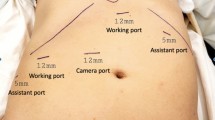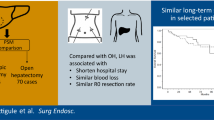Abstract
Background
Several studies have suggested that laparoscopic liver resection (LLR) is associated with fewer postoperative complications than open liver resection (OLR) for hepatocellular carcinoma (HCC). However, this issue remains controversial since the data may have been attributable to an imbalance in patients’ background.
Methods
We retrospectively analyzed 290 hepatectomies for HCC undertaken between 2011 and 2019. Liver resection difficulty was based on the 3 levels of the Institut Mutualiste Montsouris classification. Resection ratio was calculated using computed tomography volumetry. Patient characteristics were compared between the LLR and OLR groups. Propensity score matching (PSM) was adopted to adjust the imbalance between the cohorts, and the incidence of postoperative complications was compared.
Results
The difficulty and resection ratio were significantly lower in LLR (n = 112) than in OLR (n = 178) (difficulty grade I/II/III: 84/10/18 vs. 43/39/96, p < 0.001; resection ratio: 11.4 ± 12.7 vs. 22.7 ± 17.2%, p < 0.001). The incidence of postoperative complications (Clavien–Dindo grade III or more) was lower in LLR (2.7% vs. 21.9%, p < 0.001), which was mainly attributable to fewer incidences of ascites and pleural effusion. PSM generated 68 well-matched patients in each group. The lower incidence of postoperative complications in LLR was also maintained in the PSM cohort (2.9% vs. 16.2%, p = 0.017). On multivariate analysis, LLR was the independent predictor of postoperative complications (OR 0.184, 95% CI 0.051–0.672, p = 0.010).
Conclusion
The present study demonstrated that a laparoscopic approach reduces the incidence of postoperative complications in liver resection for HCC.
Similar content being viewed by others
References
Sato M, Tateishi R, Yasunaga H et al (2012) Mortality and morbidity of hepatectomy, radiofrequency ablation, and embolization for hepatocellular carcinoma: a national survey of 54,145 patients. J Gastroenterol 47:1125–1133
Law WL, Choi HK, Lee YM et al (2007) The impact of postoperative complications on long-term outcomes following curative resection for colorectal cancer. Ann Surg Oncol 14:2559–2566
Amisaki M, Saito H, Tokuyasu N et al (2018) Prognostic value of postoperative complication for early recurrence after curative resection of hepatocellular carcinoma. Hepatobiliary Pancreat Dis Int 17:323–329
Wu Q, Wei M, Ye Z et al (2017) Laparoscopic colectomy versus open colectomy for treatment of transverse colon cancer: a systematic review and meta-analysis. J Laparoendosc Adv Surg Tech A 27:1038–1050
Li Z, Zhao Y, Liu Y et al (2019) Laparoscopic versus open gastrectomy for high-risk patients with gastric cancer: a systematic review and meta-analysis. Int J Surg 65:52–60
Bhojani FD, Fox A, Pitzul K et al (2012) Clinical and economic comparison of laparoscopic to open liver resections using a 2-to-1 matched pair analysis: an institutional experience. J Am Coll Surg 214:184–195
Ito K, Ito H, Are C et al (2009) Laparoscopic versus open liver resection: a matched-pair case control study. J Gastrointest Surg 13:2276–2283
Welsh FK, Tekkis PP, John TG et al (2010) Open liver resection for colorectal metastases: better short- and long-term outcomes in patients potentially suitable for laparoscopic liver resection. HPB (Oxford) 12:188–194
Takahara T, Wakabayashi G, Beppu T et al (2015) Long-term and perioperative outcomes of laparoscopic versus open liver resection for hepatocellular carcinoma with propensity score matching: a multi-institutional Japanese study. J Hepatobiliary Pancreat Sci 22:721–727
Kubota KMM, Kusaka K et al (1997) Measurement of liver volume and hepatic functional reserve as a guide to decision-making in resectional surgery for hepatic tumors. Hepatology. https://doi.org/10.1053/jhep.1997.v26.pm0009362359
Ohshima S (2014) Volume analyzer SYNAPSE VINCENT for liver analysis. J Hepatobiliary Pancreat Sci 21:235–238
Kawaguchi Y, Fuks D, Kokudo N et al (2018) Difficulty of laparoscopic liver resection: proposal for a new classification. Ann Surg 267:13–17
Dindo D, Demartines N, Clavien PA (2004) Classification of surgical complications: a new proposal with evaluation in a cohort of 6336 patients and results of a survey. Ann Surg 240:205–213
Slankamenac K, Graf R, Barkun J et al (2013) The comprehensive complication index: a novel continuous scale to measure surgical morbidity. Ann Surg 258:1–7
Rahbari NN, Garden OJ, Padbury R et al (2011) Posthepatectomy liver failure: a definition and grading by the International Study Group of Liver Surgery (ISGLS). Surgery 149:713–724
Merath K, Chen Q, Bagante F et al (2019) A multi-institutional international analysis of textbook outcomes among patients undergoing curative-intent resection of intrahepatic cholangiocarcinoma. JAMA Surg 154:e190571
Hobeika C, Nault JC, Barbier L et al (2020) Influence of surgical approach and quality of resection on the probability of cure for early-stage HCC occurring in cirrhosis. JHEP Rep 2:100153
Sheen AJ, Jamdar S, Siriwardena AK (2019) Laparoscopic hepatectomy for colorectal liver metastases: the current state of the art. Front Oncol 9:442
Yamazaki S, Takayama T (2019) Current topics in liver surgery. Ann Gastroenterol Surg 3:146–159
Guro H, Cho JY, Han HS et al (2018) Outcomes of major laparoscopic liver resection for hepatocellular carcinoma. Surg Oncol 27:31–35
Kasai M, Cipriani F, Gayet B et al (2018) Laparoscopic versus open major hepatectomy: a systematic review and meta-analysis of individual patient data. Surgery 163:985–995
Tsai KY, Chen HA, Wang WY et al (2019) Long-term and short-term surgical outcomes of laparoscopic versus open liver resection for hepatocellular carcinoma: might laparoscopic approach be better in early HCC? Surg Endosc 33:1131–1139
Fretland AA, Dagenborg VJ, Bjornelv GMW et al (2018) Laparoscopic versus open resection for colorectal liver metastases: the OSLO-COMET randomized controlled trial. Ann Surg 267:199–207
Deng ZC, Jiang WZ, Tang XD et al (2018) Laparoscopic hepatectomy versus open hepatectomy for hepatocellular carcinoma in 157 patients: a case controlled study with propensity score matching at two Chinese centres. Int J Surg 56:203–207
Inoue Y, Ota M et al (2018) Short- and long-term results of laparoscopic parenchyma-sparing hepatectomy for small-sized hepatocellular carcinoma: a comparative study using propensity score matching analysis. Am Surg 84:230–237
Lanyun Luo HZ, Yao Y, Huang X (2015) Laparoscopic versus open hepatectomy for hepatocellular carcinoma: short- and long-term outcomes comparison. Int J Clin Exp Med 8:18772–18778
Wu X, Huang Z, Lau WY et al (2019) Perioperative and long-term outcomes of laparoscopic versus open liver resection for hepatocellular carcinoma with well-preserved liver function and cirrhotic background: a propensity score matching study. Surg Endosc 33:206–215
Kawaguchi Y, Hasegawa K, Tzeng CD et al (2020) Performance of a modified three-level classification in stratifying open liver resection procedures in terms of complexity and postoperative morbidity. Br J Surg 107:258–267
Acknowledgements
We thank H. Nikki March, PhD, from Edanz Group (www.edanzediting.com/ac) for editing a draft of this manuscript.
Funding
This research did not receive any specific Grant from funding agencies in the public, commercial, or not-for-profit sectors.
Author information
Authors and Affiliations
Corresponding author
Ethics declarations
Conflict of interest
The authors of this manuscript have no conflicts of interest to disclose as described by this article.
Ethical approval
This research was approved by the Institutional Review Board at Kyoto University Graduate School of Medicine (approval code: R1579).
Informed consent
The requirement for obtaining written informed consent from each patient was waived because of the retrospective study design.
Additional information
Publisher's Note
Springer Nature remains neutral with regard to jurisdictional claims in published maps and institutional affiliations.
Our study is registered with University Hospital Medical Information Network (UMIN, https://www.umin.ac.jp). The registration number is UMIN000041288 (https://upload.umin.ac.jp/cgi-openbin/ctr/ctr_view.cgi?recptno=R000047142).
Rights and permissions
About this article
Cite this article
Uemoto, Y., Taura, K., Nishio, T. et al. Laparoscopic Versus Open Liver Resection for Hepatocellular Carcinoma: A Case Controlled Study with Propensity Score Matching. World J Surg 45, 2572–2580 (2021). https://doi.org/10.1007/s00268-021-06115-2
Accepted:
Published:
Issue Date:
DOI: https://doi.org/10.1007/s00268-021-06115-2




